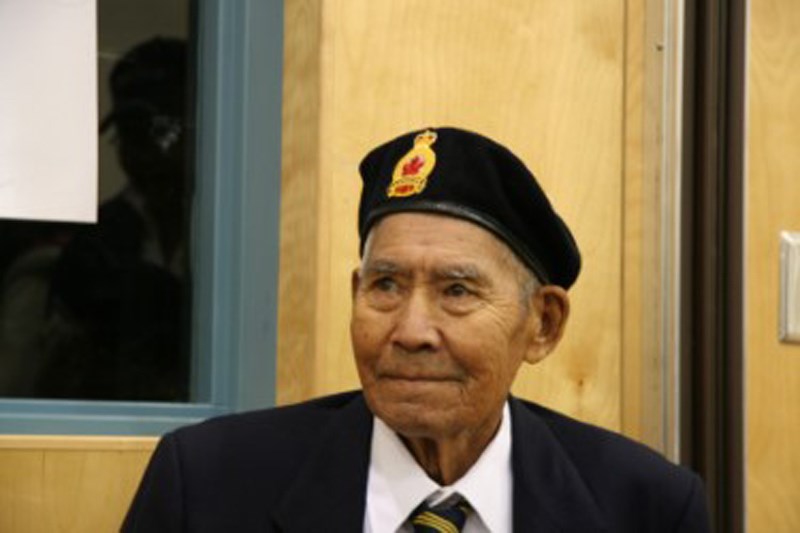Abel Peters, of the Cheslatta Carrier Nation, was one of the many Indigenous people who answered the call of duty when the Second World War erupted.
Peters was present at the largest amphibious military operation in history: Operation Overlord code-named ‘D-Day’, the allied invasion of northern France.
His friend and colleague Mike Robertson, senior policy advisor with the Cheslatta Nation, knew Peters well for over 40 years and worked to archive records and interviews from Peters’ life when he passed away in 2012.
Peters was born in Sept. of 1922 at Cheslatta Lake and was one of 10 children of Thomas Peter and Rose Louie, who was the daughter of legendary Chief Louie.
He also attended residential school at Lejac until he ran away when he was 13-years-old.
“He always had an amazing inspiration to go see places,” Robertson recollects, explaining that’s what inspired Peters to travel to Prince George and enlist.
He enlisted in the army in 1943 in the 102nd Northern British Columbians and became part of the Winnipeg Rifles.
After enlisting he trained in Alberta for two months and then travelled to Nova Scotia for final training. He went overseas in September 1943 and landed on Juno Beach on June 6, 1944, D-Day.
“I remember sitting in the kitchen one day and he was talking to me about raising his rifle over his head and walking through that water,” said Robertson.
“He said, all he could hear was noise and bombs and bullets and he knew people were dying around him and just kept walking straight ahead and he didn't know how he got to the beach without getting killed.”
Then on July 8, 1944 Peters was shot in the head by a German sniper at the Cannes Airfield. He received extensive head and arm injuries but miraculously survived.
“He said the next thing he remembers is he woke up in England and there he was in a hospital, and he'd always talk about how nice like nurses were and how looked after him,” said Robertson.
Despite the severity of his injuries, Peters was eager to return to the battlefield.
“He was pretty badly wounded, but his commander came to him and Able says ‘I'm ready to go back. I want to go back,” and the guy says ‘No, your war is over Able’.”
His left arm ended up being one inch shorter than his right arm because of his injuries and he had to have a steel plate put in his skull. He was in the battlefield for only 28 days before returning to Canada.
Peters ended up in Vancouver and stayed at a hospital for soldiers to recover from his injuries. He then went to Victoria to a convalescent facility and stayed for several months to regain use of his arm and strength in his legs.
Once he was discharged, he found his way to Quesnel to work in a sawmill but a workplace injury to his hands forced him back to Vancouver for medical treatment.
When he finally recovered, he went back to Cheslatta Lake and bought a truck and started a sawmill.
“He had a plate in his head, and he blacked out a lot but when he did finally make it back to Cheslatta, he recalls greatly the welcome that he got back, especially, from his mother. He really loved his mother,” remembers Robertson.
“He didn't receive a lot of the standard benefits that returning veterans got like offers of education funding or land and all those kinds of rights, but he always received a pension and with that money he bought a sawmill.”
In April 1952, he also served as the translator for the Cheslatta Carrier Nation when Alcan and the Department of Indian Affairs forced people to surrender their land and villages.
“He was always very angry about how they treated the people and when we were researching the eviction and the relocation he was the prime witnessed we had.”
Ultimately he had to relocate his sawmill to Grassy Plains, where he spent the rest of his life.
He married May Jack and together they raised 12 children. He later became Chief of the Cheslatta Carrier Nation from 1962-1964 and a Band Councillor from1966-1968 and again 1985-1990.
“He would always very proudly go to the November 11 ceremony and as he got older, he got more involved,” said Robertson.
“Native veterans were not treated on par with the white people or the non-native native people. You know, we did some work here to get metals and recognition, but records were not well-kept for the Indigenous boys that fought. There was a lot that we didn’t know.”
Robertson also wrote a poem for Peters called The Cycle inspired by a conversation they had in 2007 while flying from Prince George to Victoria.
As the pair were flying over the mountains, Peters remarked that it looked like the mountains were poking holes into the clouds.
“He was a really romantic kind of thinker and speaker,” said Robertson. “He was always thinking and wondering.”
Abel Thomas Peters passed away from cancer peacefully on August 15, 2012 just short of his 90th birthday.



